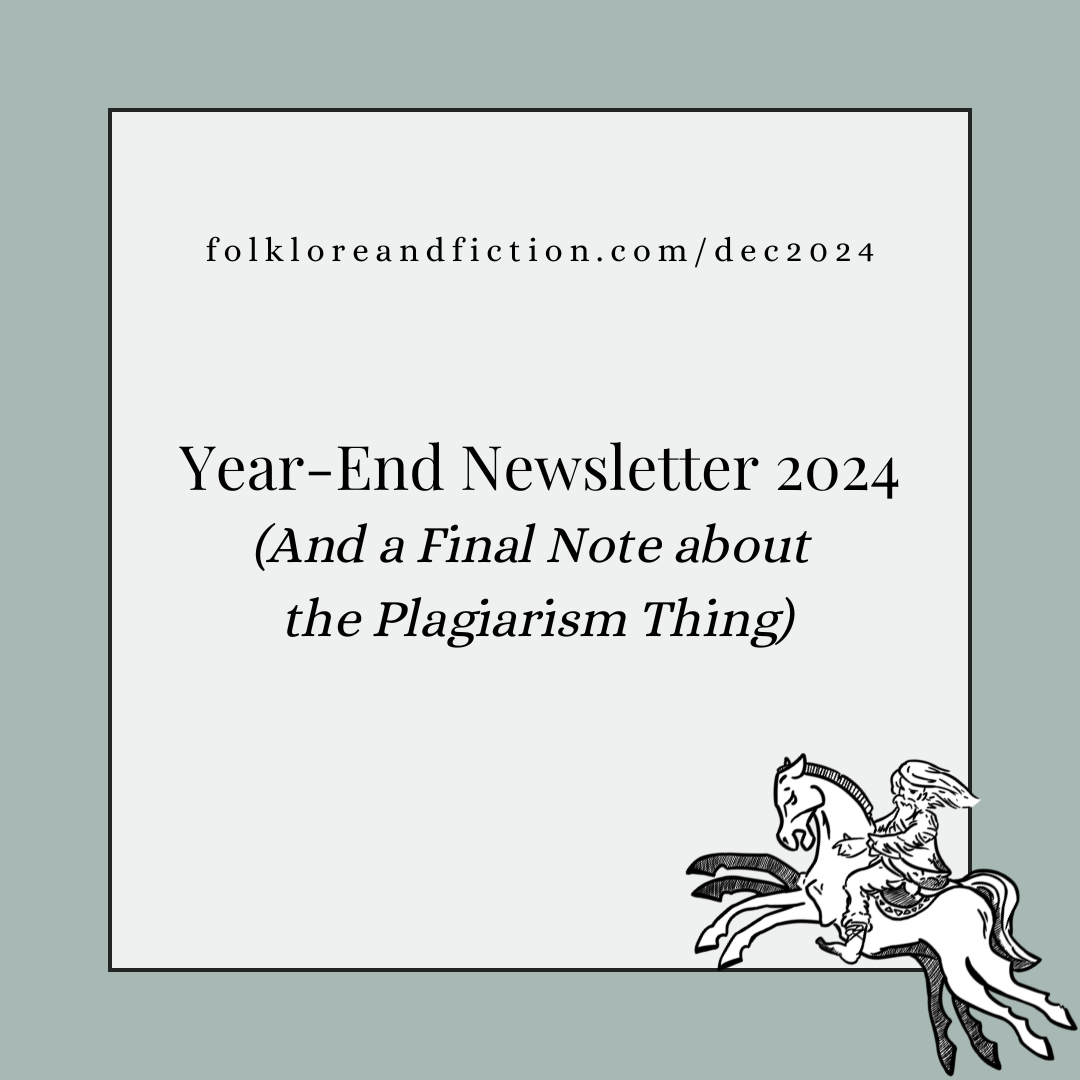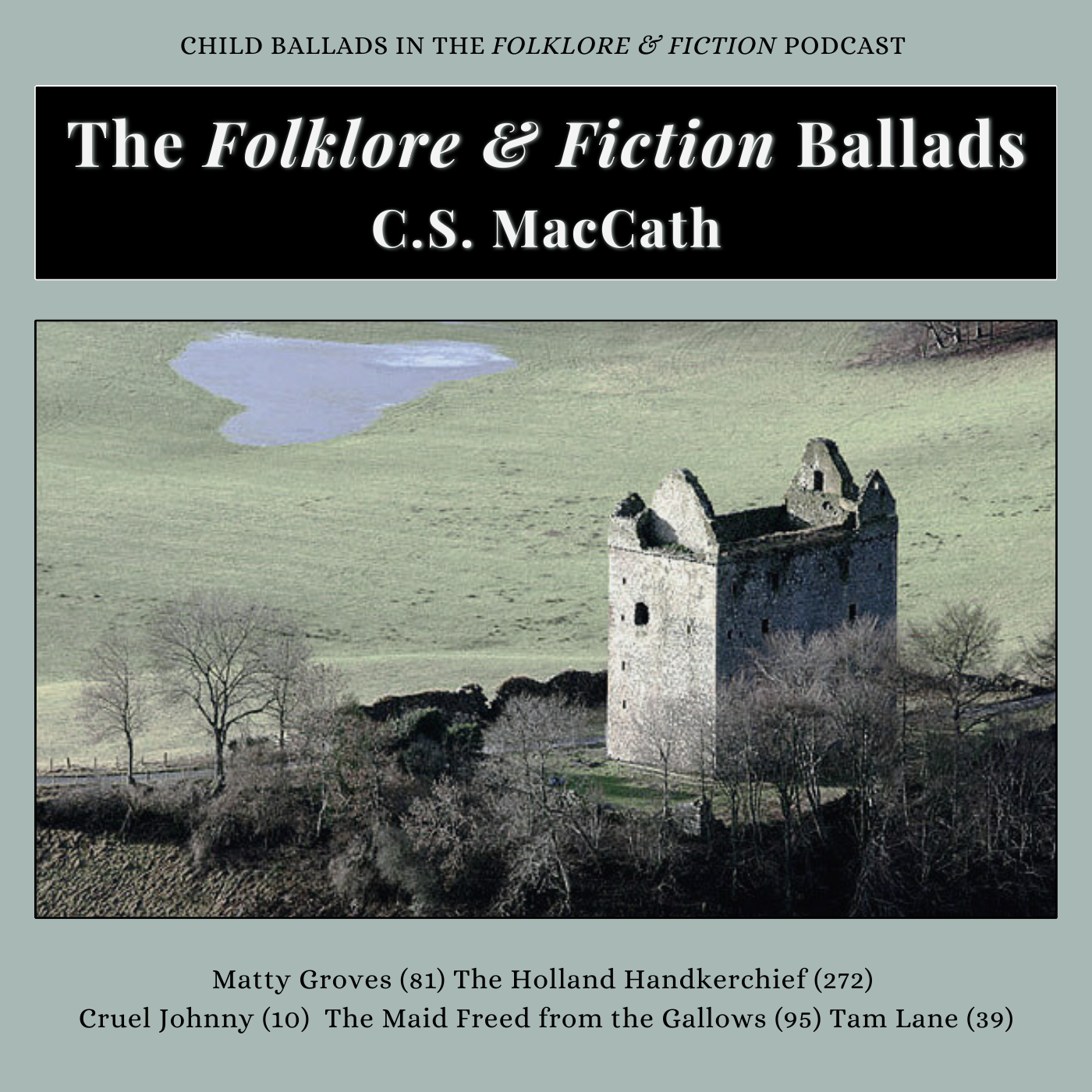Dear Friends,
This is just a year-end note to let you all know where the Folklore & Fiction project stands. The new website is almost done, which means the Folkbyte newsletter and short educational videos will resume in the new year. As I'll mention in January's Folkbyte, my web hosting plan and dated website were not robust enough to handle the influx of subscribers this year, and they finally gave up the ghost. But I'm fortunate to be married to a world-class software engineer and web developer, who has been working through evenings and weekends to build a new bespoke website for me. I can't wait to show it to you.
The Storyteller's Guide to Folklore is also progressing apace. I'm about a third of the way done with the manuscript, and it's a richer offering than the dispatch and podcast series ever hoped to be, which was the point of producing the series in the first place. I'm excited about this work, and I think it will be of help to storytellers of all kinds. It's presently out on query and submission with several agents, and I'll be sure and let you know when I have news on that front. I'm also working on The Folklore & Fiction Ballads, a remastered collection of the Child Ballads I recorded for the Folklore & Fiction podcast. All of the songs are recorded (though I might re-record the vocal part for one of them this weekend), and I'm moving into the mastering phase of the project. I've released the new cover (below), which has a folk music archive vibe I really like.
I also want to write one last time about the problems I've had with plagiarism of my work, because I want you to understand some of what was happening behind the scenes for me professionally and emotionally this year. From 2019-2022, two folklore influencers mined the Folklore & Fiction project for ideas and monetized some of them in ways that caused our mutual colleagues to suggest that my work was derivative of theirs. I asked the influencers twice to stop stealing from my work, but they refused, and the second time they tried to bully me into silence with an attorney. Early this year, an author in my Folklore & Fiction Facebook group stole a book idea I presented to my audience by rushing to her publisher and signing a contract to write a similar book. Later this summer, a writer and editor blatantly plagiarized three of my dispatches in an article for her magazine's audience.
All of these people are connected to the speculative fiction and folklore communities, so their collective disregard for my intellectual property left me feeling like an outsider in a community I've loved and worked hard to belong in for over a decade. Worse, two of our mutual friends quietly sided with the bullies in ways they clearly hoped I wouldn't notice. So I removed them from my newsletter and social media connections because as Gwen Stefani might say, I ain't no hollaback girl. But by the time I crossed the stage at my convocation in October, I was struggling emotionally. All of the people who stole from me had larger platforms than I did when they stole my work, and they all have strong relationships with well-known members of my professional communities. Worse, I had proof the guilty parties were poisoning the well in the whisper network. So at a moment when I should have been happy to finally have my PhD, I felt isolated and targeted.
Over the past year, I've written about these incidents in general terms, and several people have asked why I didn't name and shame the plagiarists. Here's why. Three of them have PhDs, and they stole from work I completed while I was a graduate student, so I can't just point a finger at them on the Internet. I would have to file formal complaints against them, because the power disparity between us is actionable through the ethics and integrity offices at the universities that awarded their degrees and for whom they are employed. These complaints would be a matter of public record while they were ongoing, so my life would cease to be about my work until they were resolved. I'd have to manage the complaints themselves, and I'd have to manage the public fallout, and then I'd have to hope my writing career wasn't ruined by it all. At 35, I would have already filed the paperwork. But at 55, my time is more precious to me than it once was, and I just want to make art while I still have breath to do it.
So I've fought the plagiarists privately, and I've protected my work as best I can. But my heart is pretty well broken, and I haven't kept that from you as cleanly as I would have liked. There's some truth to what they say about Gen X. We just soldier on, and we don't like to be seen as weak. So I'm soldiering on. I'm not entirely certain who among my colleagues are friends right now, and I could really use a solid win. But if my work is good enough for them to steal, it's good enough for me to sell, so I'm going to do that if I can. Meanwhile, I've decided to shutter the Patreon account permanently because I no longer share my work in progress for obvious reasons, and I'm taking steps to heal emotionally. The first step was acknowledging that I've been bullied and that bullying takes a specific kind of toll on the mind and heart. The second step is to reassure you that I'm still here, and I'm still me, and I've got this.
Thanks for reading, and happy holidays. I'll see you in the new year.
Blessings,
Ceallaigh


